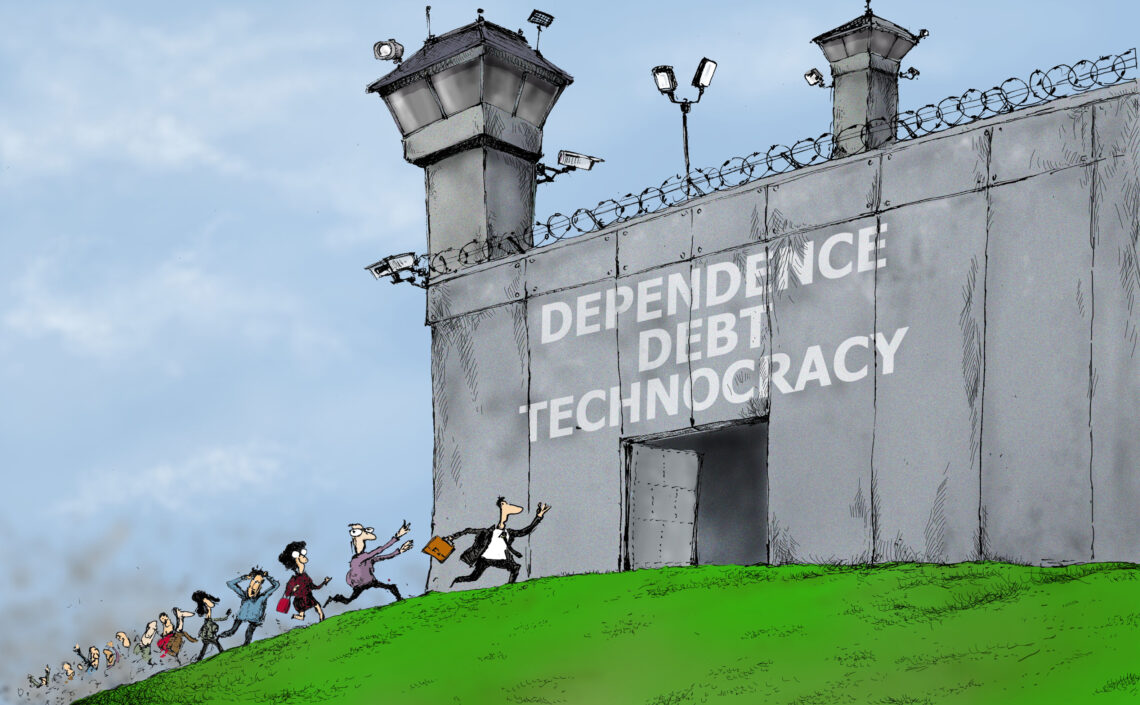In a panicked world, critical thinking is essential
The world is focused on the pandemic and the U.S. elections, and the dire scenarios many say they will bring. While both are important, it is crucial to understand that reacting with alarm will only lead to bad outcomes.

The Covid-19 pandemic and the presidential election in the United States have completely absorbed the attention of the Western world. The panic surrounding the coronavirus is blinding societies to other critical issues and leads them to adopt measures that limit personal freedom. In the U.S. election campaign, each side is predicting disaster if the other side wins. Trust in the checks and balances that the U.S. Constitution provides is faltering.
Unfortunately, dogmatic thinking dominates both the media and politics. Certain ideas have been declared “alternativlos,” to use German Chancellor Angela Merkel’s preferred mantra – they must be adopted by all, because there is no alternative. At times like these, some independent thinking is necessary. There are always alternatives.
The danger of ‘groupthink’
Many worry that Covid-19 – to paraphrase Klaus Schwab, the founder of the World Economic Forum – is humankind’s greatest catastrophe since World War II. Societies are now willing to tolerate any means to contain the disease, regardless of whether it violates constitutions, laws or personal freedoms.
Should we not trust more in people to be responsible for themselves?
So far, most consider a vaccine the only possible solution. Public money is being pumped into research on a scale many times larger than would normally be necessary. The downside of this “groupthink” is that other crucial research and development projects are neglected, while the collateral damage is being ignored.
Though we should not trivialize the difficulties, one might also ask why there is such alarm. Certainly, Covid-19 is an important health concern. It makes sense to be cautious and to develop a safe vaccine. But that is not the only solution. Should we not trust more in people to be responsible for themselves?
The long-term remedy is to better promote prevention and a healthy lifestyle. This is the purpose for which authorities and the media should really be using this crisis. Health policy should switch decisively from concentrating strictly on caring for the sick to supporting prevention.
Limiting freedom
Another danger lies in contact tracing. It makes sense to follow the path of the contagion and warn those who might have been exposed. However, such systems are dangerous in the long term: governments could abuse them to monitor citizens and limit their freedom. The pretext could change from fighting the disease to, for example, fighting crime and terrorism.
Under such circumstances, the totalitarian principle of “the end justifies the means” triumphs and eliminates the most important ingredient for a free society: the presumption of innocence. This already occurs with the retention of telecommunications data in Europe, despite the European Court of Justice declaring such practices incompatible with the European Union’s Charter of Fundamental Rights.
Tunnel vision
There is also a single-mindedness on both sides of the U.S. election. It is understandable for politicos to exaggerate, but regular observers should remember that the American system provides for checks and balances. Although the president’s role is crucial, we must not overestimate its power. We should also not be overwhelmed by the dark scenarios predicted by political analysts and the media. Instead, we should look at the facts.
Yes, Covid-19 is a challenge, but we should not blindly concentrate on that alone. It is not the only challenge. Similarly, the polarizing U.S. election also tends to give the public tunnel vision. That these two issues are dominating the headlines is a situation that various parties could use to their advantage.
The ‘reset’ could allow governments to prolong exceptional measures.
China is one. Beijing has become increasingly aggressive toward Taiwan. It could take further action against the island democracy, using the cover of confusion in Washington during or after the election. It would seem Beijing has been preparing for such a moment – steeling itself against sanctions and gearing up for conflict. It continues to decouple from the West, building a system of dependent states, solidifying its supply chains and stockpiling commodities.
European governments and Brussels are another example. Based on the panic over Covid-19 and enthusiasm for “green investments,” they have received a blank check to spend, financed by the European Central Bank. The huge additional expenditures they make will ultimately erode the purchasing power of the euro.
The World Economic Forum has declared that the pandemic offers a chance for humanity’s “Great Reset.” But we should also be wary that the “reset” the pandemic creates could be misused by bureaucracies, newly empowered by technology. Such technologies may be employed to force people to comply with new rules that leave little room for individualism. Democracy and free societies might become dominated by a bureaucratic technocracy. Public health is always a good pretext to introduce technocratic centralization.
That is why critical thinking, and not blindly believing in mainstream opinions, is necessary. Individual responsibility is in high demand.
